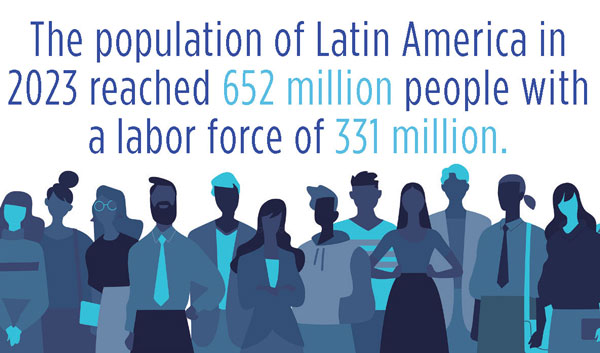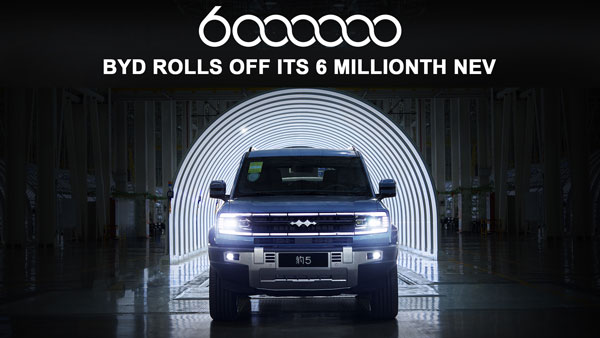Even as U.S.-based multinationals hedge location bets by nearshoring and friend-shoring operations to Latin America and the Caribbean and reducing their reliance on China, Chinese companies are also investing heavily in Latin America.
Since January 2021, Site Selection’s Conway Projects Database has tracked 57 major facility investments across Latin America from Chinese companies — 45 of them in Mexico, five in Brazil and a few scattered across Argentina, Chile and Colombia. Meanwhile, countries across the region scurry to negotiate new trade agreements with the People’s Republic.
In a February report on China’s outward FDI in the electric vehicle sector, Rhodium Group reported that “EV producers including BYD, Chery and SAIC-owned MG are scouting locations in Mexico.” MG Motor and SAIC invested $19 million last year in a parts distribution operation in San Luis Potosí, and unnamed sources told the Financial Times in December that MG aims to build a Mexican factory with an investment as large as $2 billion, with another unnamed Chinese battery company considering a $12 billion investment.
“Production in Mexico could enable Chinese firms to not only become IRA [Inflation Reduction Act]-compliant but also make use of cheaper labor and capital costs to supply the U.S. market,” the Rhodium Group report says. “Investments in Mexico might also face less local political pushback compared to a site in the U.S., where Chinese battery projects have received numerous complaints from local lawmakers for being linked to the CCP or creating cyber vulnerabilities in U.S. critical infrastructure.
“The tentative investment plans and large volume of Mexican car imports from China in 2023, mainly internal combustion engine vehicles, have alarmed DC policymakers,” Rhodium said. “To prevent Mexico becoming a backdoor for Chinese companies, the U.S. Treasury Department negotiated an agreement with Mexico in December 2023 to improve Mexico’s investment screening procedures. We will have to wait to see whether such arrangements end up chilling Chinese EV investment in Mexico.”
Covering the Territory
There’s nothing chilled about Chinese projects across Latin America for now, including Sailun Tire Company’s plans to create 1,400 jobs with a $424 million plant in Irapuato, Guanajuato, Mexico, and Ganfeng Lithium’s investment in Lithium Americas’ Pastos Grande lithium brine project in Salta, Argentina.
BYD, which delivered its first batch of electric buses to the streets of Mexico City in January, first invested years ago in an electric bus and battery complex in Campinas, Brazil, not far from where, in 2022, the company’s rail vehicles for São Paulo’s Metro Line 17 (Gold Line) SkyRail are being delivered. The company’s HAN EV model first arrived in 2021 in Brazil, Mexico, Colombia, Uruguay, the Dominican Republic, Costa Rica and the Bahamas. The company’s first foray into South America goes back a decade to 2014, when under the watchful eyes of Chinese President Xi Jinping and then-Brazilian President Dilma Rousseff, BYD committed to construct its first iron-phosphate battery factory in South America.

BYD also is building a cathode plant in Chile, where fellow Chinese company Tsingshan is investing in a lithium-iron-phosphate plant. Tsingshan is also a partner with Europe’s Eramet on a lithium project in Argentina. China’s CATL seeks to mine lithium in Bolivia.
In August 2023, while celebrating rave reviews in Brazil for its BYD YUAN PLUS EV model, BYD announced that, in collaboration with the Bahian government, it will “start operations in three factories simultaneously in Camaçari. One will be dedicated to the production of chassis for electric buses and trucks, a second for hybrid and electric automobiles, and a third for lithium and iron phosphate processing. Over the next several years, these three factories are expected to generate more than 5,000 jobs” with an investment projected to be around $600 million. That same month, the company delivered its first double-decker electric buses to Argentina.
South America is central to the company’s growth plans. In celebrating the roll-off of its 6 millionth “new energy” vehicle at its plant in Zhengzhou, China, in November 2023, the company announced it now has entered 58 countries and regions, sold more than 200,000 passenger vehicles and achieved “significant victories in the new energy vehicle market in Thailand, Brazil and other locations.”
In March of this year, BYD said it would boost the overall Camaçari investment to $1.1 billion, while also building enough housing to house more than 4,200 employees, according to a report from La Fundación Andrés Bello – Centro de Investigación Chino Latinoamericano, an independent organization dedicated to investigating and analyzing relations between China and the countries of Latin America and the Caribbean.
Chinese carmaker Chery is investing $400 million alongside Argentina’s Socma Group in a new manufacturing plant in Santa Fe, Argentina. According to published reports, the plant will be supplied with batteries from Chinese battery maker Gotion High-Tech’s plant in northern Argentina. Chery invested the same amount in a plant in Jacareí, Brazil, in São Paulo State that opened in 2014. But the plant is suspending production until 2025 as it converts from internal combustion to hybrid and electric vehicles.
While it doesn’t have manufacturing in the country, Chery also has received a $50 million investment from the Vardí Group to open 10 showrooms and workshops across Colombia that will create over 200 direct jobs.

